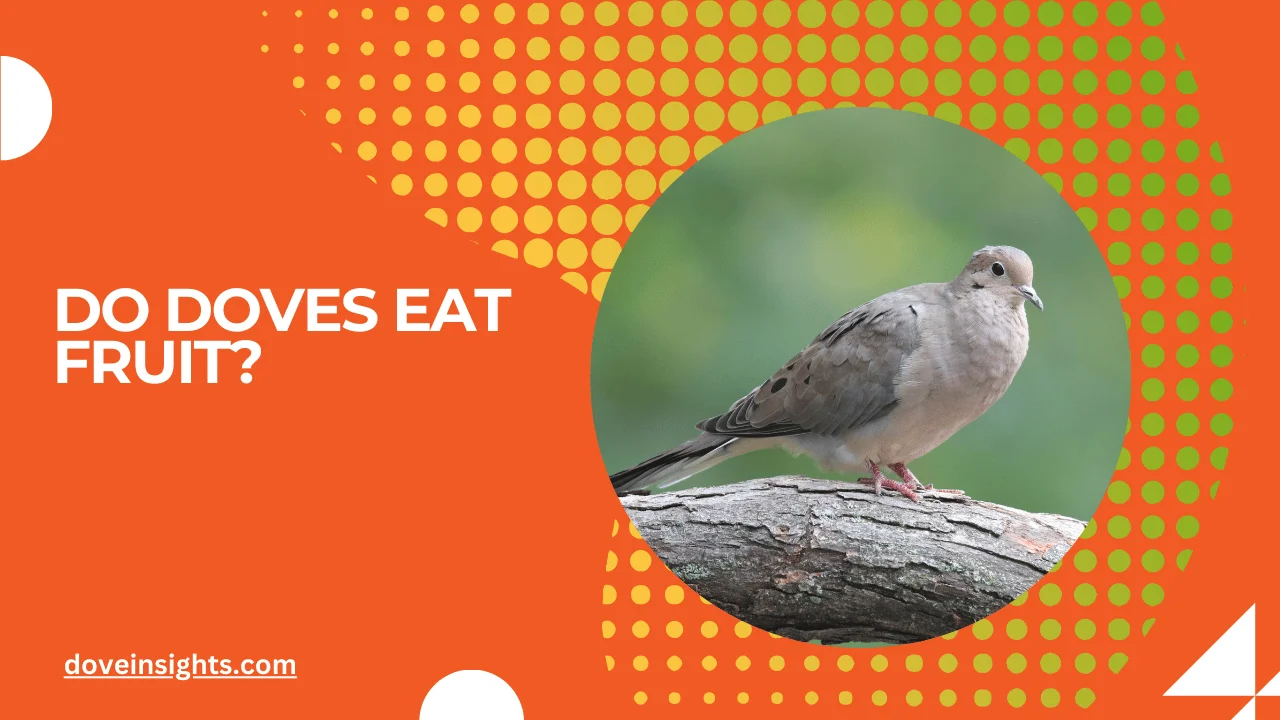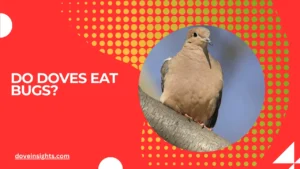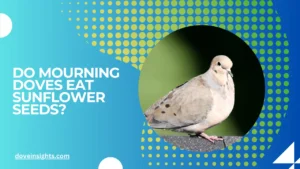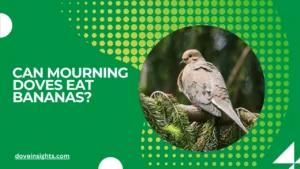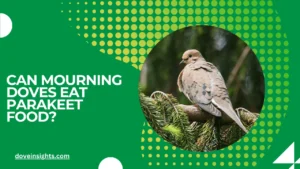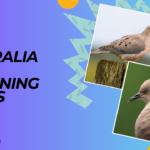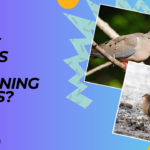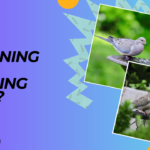When you think of doves, the first thing that likely comes to mind is their peaceful cooing or graceful flight.
These birds are often seen pecking at seeds on the ground or perched in trees, their gentle nature synonymous with calmness. But beyond their serene exterior, many wonder—do doves eat fruit?
While we generally associate fruit-eating with colorful parrots or mischievous squirrels, the dietary habits of doves are more diverse than they appear.
At first glance, it may seem like doves would stick to the typical birdseed diet, nibbling on grains and seeds. But, just like many other wild birds, doves can have a surprisingly varied diet that includes fruit—not just for nutrition but also for their hydration and overall health.
This article explores the question of whether doves eat fruit, what types they prefer, and how their feeding behavior relates to their habitat and survival. You’ll be surprised at how doves incorporate fruit into their feeding routines and what this means for both wild and domesticated doves.
By the end of this article, you’ll gain a deeper understanding of the doves’ diet, their relationship with fruits, and how their feeding habits reveal more about their role in the ecosystem. So, let’s uncover the truth about what doves eat!
Contents
Understanding the Dove’s Diet – What Do They Typically Eat?
To answer the question of whether doves eat fruit, it’s important to first examine their basic diet.
Doves, particularly the most common species like the Mourning Dove (Zenaida macroura) and Rock Dove (Columba livia), are primarily granivores, meaning they mainly consume seeds. Their beaks are perfectly designed for pecking at seeds, and their digestive systems are efficient in processing these small, hard foods.
In the wild, doves feed on a variety of seeds, including those from grasses, weeds, and cultivated plants. They are also known to forage on insects, grains, and vegetation, depending on what is available in their environment.
Their ability to adapt their diet based on the seasons is one of the reasons doves are so widespread and resilient. During colder months when seeds might be scarce, they may turn to fruit or other plant-based foods to supplement their diet.
That said, while seeds make up the bulk of their diet, doves are not strictly seed eaters. Their ability to consume a variety of food items, including fruits, reflects their adaptability in different ecosystems.
So, while they are known for eating seeds, their diet isn’t limited to just that. Let’s now look at whether they actively seek out and consume fruit.
The Fruit Preferences of Doves – What Do They Eat?
Doves, like many other birds, are opportunistic feeders. This means that if they come across fruit in their environment, they will often eat it.
However, not all fruits are part of their regular diet. Doves are more likely to consume soft, fleshy fruits that are easy to digest, rather than hard, pitted fruits or citrus fruits that might be too acidic.
Some of the fruits commonly consumed by doves include:
- Berries: Doves are particularly fond of berries such as blackberries, blueberries, and strawberries. These fruits are rich in nutrients, and their soft texture makes them an easy snack for doves.
- Cherries: Doves have been observed pecking at cherry trees, consuming the fleshy fruit when they’re in season.
- Figs: Figs are another fruit that doves enjoy, particularly because of their high moisture content, which is vital for hydration.
- Grapes: In areas where grapes grow abundantly, doves can often be seen pecking at grape vines or eating fallen grapes.
- Apples and Pears: While not as common, doves can be attracted to apple and pear trees, especially when the fruit is overripe and soft.
Doves are drawn to fruit because of its high water content, which helps with hydration. During the hot summer months, fruits like berries, cherries, and figs become a valuable water source for doves, especially in areas where clean water might be scarce.
Fruit also provides essential vitamins and minerals, helping them maintain their health and energy levels.
Interestingly, doves often feed on fruit that has fallen to the ground rather than picking it from the tree. This is because their feeding behavior involves foraging on the ground, where they are able to easily access food that other animals might overlook.
How Doves Forage for Fruit – Their Feeding Behavior
Doves are ground feeders, and this behavior extends to their consumption of fruit. Unlike some birds that may perch on trees to consume fruit directly, doves are more likely to search for fruit that has already fallen to the ground.
Their feeding habits are designed around their low-maintenance foraging style—doves don’t need to climb trees or fly long distances to find food. Instead, they rely on their ability to find food on the ground, whether it’s seeds, insects, or fruit.
When it comes to fruit, doves are opportunistic.
They will consume any fruit that is within reach, but they tend to prefer overripe or fallen fruit because it is softer and easier to eat. This behavior is especially common when fruit is abundant, and doves have access to a variety of different fruits in a single area.
Fallen fruit also tends to have a higher water content, making it an attractive option for doves in warmer months when hydration is crucial.
Interestingly, while doves are opportunistic feeders, they don’t typically cache fruit (store it for later), unlike some other bird species like crows or squirrels. Instead, they eat what they can find and move on.
This makes their feeding behavior more closely aligned with that of other granivorous birds, even when they include fruit in their diet.
The Nutritional Benefits of Fruit for Doves
The inclusion of fruit in a dove’s diet isn’t just about taste—it also offers various nutritional benefits that contribute to their overall health.
Fruits provide a wide array of vitamins (such as Vitamin C, Vitamin A, and B-vitamins) and minerals like potassium, magnesium, and calcium, all of which are essential for the bird’s metabolism, bone health, and immune function.
In addition to vitamins and minerals, fruit also offers a good source of fiber, which aids in digestion. For doves, whose diets are often high in seeds, the additional fiber from fruit helps to balance their digestive system and prevent issues like constipation.
The high water content of fruits such as berries and figs also plays a crucial role in maintaining the dove’s hydration levels, especially during hot weather when water may be more difficult to find.
Fruits like grapes and berries are particularly beneficial because of their antioxidants, which can help protect doves from environmental stressors and diseases.
The natural sugars in fruits also provide a quick source of energy, essential for the dove’s flight and daily activities.
Thus, fruit serves as an important supplement to the primary seed-based diet of doves, offering both hydration and nutritional support.
Domestic Doves and Fruit – Should You Feed Them?
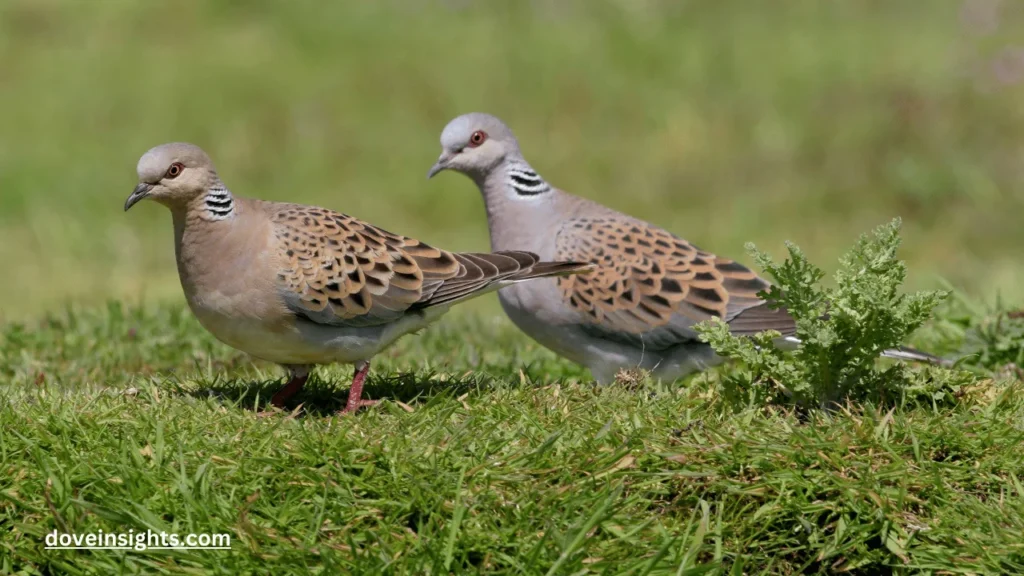
If you have domestic doves or pet doves, you might be wondering if it’s okay to include fruit in their diet.
The answer is yes—doves can eat fruit, but it should be provided in moderation. A varied diet is essential for keeping pet doves healthy, and fruit can be an excellent addition. However, there are a few precautions to keep in mind.
- Moderation: While fruits are healthy, they should not replace the primary diet of seeds and pellets. Overfeeding fruit can lead to obesity or digestive problems.
- Wash Fruit Thoroughly: If you’re feeding domestic doves fruit, ensure that it is free of pesticides or chemicals. Always wash fruit thoroughly before offering it to your bird.
- Avoid Toxic Fruits: Some fruits, such as avocados, can be toxic to birds. It’s important to avoid feeding any fruit that might be harmful to doves, and always research a fruit before offering it.
By offering small portions of fresh fruit, such as berries, apples, or bananas, you can enrich your dove’s diet and provide them with extra nutrients. However, always ensure that fruit is given as a treat or supplement, not as the main part of their diet.
Conclusion:
In conclusion, while doves are primarily known for their consumption of seeds, they do indeed eat fruit as part of their diverse diet.
Whether they’re nibbling on berries, cherries, or figs, fruit provides doves with valuable hydration, nutrition, and energy. Their feeding behavior reflects their adaptability and ability to thrive in a variety of environments, from urban areas to more natural habitats.
For pet owners, offering fruit to domestic doves in moderation can help ensure they maintain a healthy, balanced diet. Whether wild or domesticated, doves’ consumption of fruit highlights their role in the ecosystem and their ability to utilize available resources efficiently.
So next time you spot a dove, consider the diversity of their diet and the hidden nutritional role that fruits play in their survival and well-being.
FAQ’s
Do doves only eat fruit?
No, doves are primarily granivores, meaning their main diet consists of seeds, but they will also eat fruit if it’s available.
Can pet doves eat fruit?
Yes, pet doves can eat fruit in moderation as part of a balanced diet, but it should not replace seeds as their main food source.
What types of fruit do doves eat?
Doves enjoy berries, cherries, grapes, figs, and apples. They tend to prefer soft, ripe fruit.
Is fruit good for doves?
Yes, fruit provides important vitamins, minerals, and water, which help support doves’ health and hydration.
Can doves eat citrus fruits?
It’s best to avoid citrus fruits like oranges or lemons, as their acidity can be hard on doves’ digestive systems.
Do wild doves eat fruit?
Yes, wild doves will eat fruit, particularly fallen fruit or overripe fruit as it is easier to consume and provides hydration.

